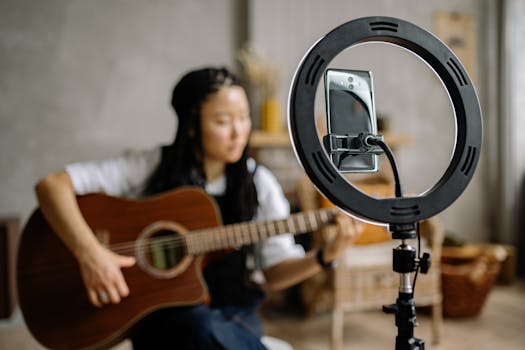Music marketing is an essential part of the music industry, allowing artists to share their work and connect with audiences. Whether you are a newcomer or an established artist, understanding music marketing can significantly impact your career.
The music landscape is continually evolving. With new platforms and technologies emerging, artists must adapt their marketing strategies to remain relevant and accessible to their audiences. Maximizing exposure is vital in capturing listeners’ attention amidst the competition.
This article will explore music marketing’s various facets, covering strategies, tools, and concepts that can guide you in promoting your work effectively. By gaining insights into these areas, artists can create tailored marketing plans that resonate with their unique styles and target audiences.
What is Music Marketing?
Music marketing involves promoting music and artists to various audiences. It encompasses a variety of strategies, tools, and techniques designed to enhance visibility and engagement effectively. The primary goal is to connect fans and artists meaningfully.
Understanding the fundamentals of music marketing is vital. This understanding allows artists to navigate the complex landscape of the industry and reach their desired audience. Artists can leverage multiple channels to ensure their music gets the exposure it deserves.
A few channels include social media, streaming platforms, and live performances, each serving different purposes. Social media helps build a brand and connect with fans, while streaming platforms can distribute music to a broad audience.
Moreover, live performances create personal experiences, helping artists to engage with fans directly. By combining these elements within a comprehensive marketing strategy, artists can maximize their reach and impact.
In summary, music marketing is not merely promotion; it includes building relationships and growing brand awareness. Effective strategies create a loyal following and foster long-term success for artists.
The Importance of Digital Marketing in Music
Digital marketing is increasingly important in the music industry. It allows artists to reach broader audiences and promote their music effectively. With the rise of the internet, traditional marketing methods have taken a backseat.
Social media platforms such as Instagram, Facebook, and TikTok provide valuable tools for outreach. These platforms enable artists to create engaging content that resonates with fans and enhances their overall brand identity.
Additionally, email marketing remains a powerful tool for keeping fans informed. By crafting compelling newsletters, artists can share updates, new releases, and live shows while maintaining direct communication with their audience.
Moreover, the role of streaming platforms cannot be overlooked. Platforms like Spotify and Apple Music offer artists diverse ways to monetize their work. They help artists track their performance and adjust their strategies accordingly.
Digital marketing is the cornerstone of an effective music marketing plan by making it easier to adapt and evolve strategies. Artists who utilize these tools can position themselves for a successful career.
Building Your Brand as a Musician
Branding is a crucial aspect of music marketing. It helps artists convey their message and connect with audiences on an emotional level. A strong brand can set an artist apart from the competition.
To build a compelling brand, artists should define their unique identity. By considering their style, influences, and target audience, they can create a cohesive image that reflects their music.
Visual elements such as logos, color schemes, and album artwork play an essential role in branding. Thoughtfully designed visual assets create a recognizable look that complements an artist’s sound.
Consistency across all platforms is vital for strong branding. Whether engaging with fans on social media or releasing music, maintaining a consistent message helps to reinforce an artist’s identity.
Ultimately, a well-defined brand fosters deeper connections with fans, leading to loyalty and increased support over time. By investing time and energy into branding, artists can pique interest and grow their following.
Marketing Strategies for Musicians
Developing effective marketing strategies is essential for achieving success in the music industry. Various tactics can be employed to reach audiences and promote music, ensuring maximum exposure.
One popular strategy is content marketing, which involves creating valuable content that engages fans. This can include behind-the-scenes videos, blog posts, or engaging social media updates that highlight the artist’s personality.
Collaborations with other artists can also broaden reach. By working with musicians from different genres, artists can tap into new fan bases and create cross-promotional opportunities.
Another effective strategy is utilizing playlists on streaming platforms. Getting featured in curated playlists can significantly boost the visibility of an artist’s music. This can lead to increased streams and followers.
Finally, consider running paid advertisements on social media and streaming platforms. Targeting specific demographics can result in higher engagement and a more effective reach for music promotion.
Utilizing Social Media for Music Promotion
Social media acts as a crucial tool for promoting music and connecting with fans. Each platform offers unique features that can enhance engagement and reach a broader audience.
Platforms like Instagram are visual by nature, allowing artists to showcase their personality through images and videos. Engaging stories or reels can keep fans invested in an artist’s journey.
Twitter is suited for real-time interactions, making it perfect for announcements and engaging discussions. Artists can utilize hashtags to participate in trending conversations and broaden their audience.
YouTube serves as both a video-sharing platform and a music streaming service. Artists can upload music videos, lyric videos, or even vlogs, creating a diverse range of content that appeals to different fans.
Lastly, TikTok has gained prominence as a promotional tool, especially for music. Viral challenges and trends can introduce songs to millions of potential listeners in an entertaining and engaging manner.
Events and Live Performances as Marketing Tools
Live performances and events remain some of the most effective ways to market music. These interactions create memorable experiences, fostering loyalty among fans and enhancing an artist’s presence.
Performing at local venues can help establish a fan base. By engaging with local communities, artists can cultivate relationships and drive word-of-mouth marketing.
Participating in music festivals offers exposure to broader audiences. An artist’s performance can introduce their music to fans who may not be familiar with their work.
Online concerts have also gained popularity, especially due to recent global events. By streaming performances, artists can reach fans worldwide, transcending geographical barriers.
Creating merchandise for events can further support artists financially. T-shirts, posters, or exclusive items can not only enhance the performance experience but also serve as marketing tools.
Conclusion
Understanding music marketing is crucial for artists striving for success in the ever-evolving music industry. By embracing digital strategies, building a solid brand, and utilizing diverse marketing channels, musicians can enhance their reach.
Incorporating live performances and social media into their marketing strategies allows artists to foster relationships with followers and maintain engagement over time. Continuous adaptation and creativity remain essential.
Ultimately, a well-executed music marketing plan can connect musicians with their audience, leading to meaningful relationships and long-term success. As the industry evolves, staying informed and flexible will benefit artists immensely.


